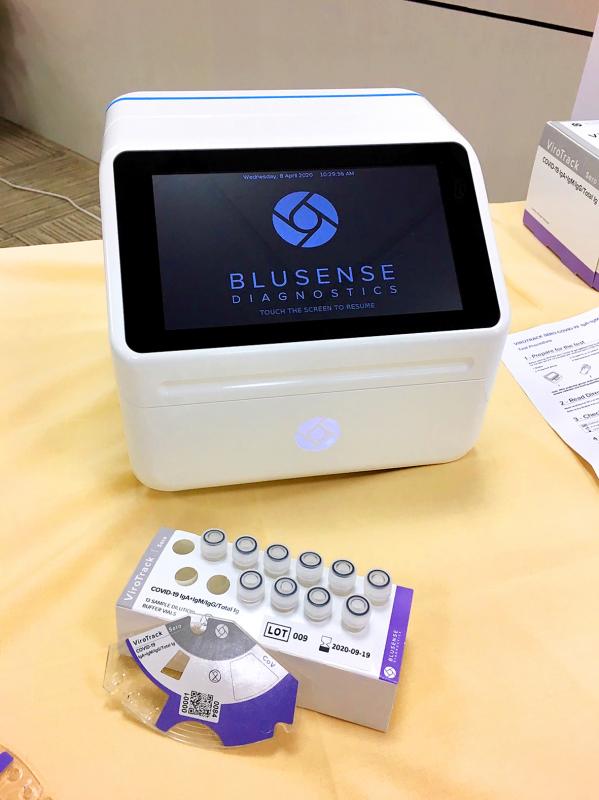Taiwanese-Danish firm BluSense Diagnostics has developed a device to diagnose COVID-19 with 90 percent certainty within 12 minutes using one drop of blood, and the EU next month could license it for use and it could be available in Taiwan by June.
Company president Filippo Bosco and executive vice president Jessie Sun (孫偉芸) yesterday demonstrated the machine at a news conference.
The device, no larger than an electronic blood pressure monitor, can detect immunoglobulins M and G, which are antibodies produced in the body in the early and mid-late stage of COVID-19 infection, Sun said.

Photo: Yang Mien-chieh, Taipei Times
As it is capable of producing results within 12 minutes, the machine could help detect whether patients are infected during the recovery period, screen local cluster infections, detect asymptomatic patients and screen those traveling abroad, she said.
It could also be used to verify whether patients should be cleared to leave the hospital, she added.
The machine last week underwent preliminary clinical tests at the Hvidovre Hospital near Copenhagen, Bosco said.
It has been able to identify whether the 15 subjects used in testing were positive or negative for the SARS-CoV-2, the virus that causes COVID-19, he said.
The company next week is looking to hold a larger-scale clinical trial — about 200 subjects — in Italy, Bosco said, adding that negotiations for conducting clinical trials in Taiwan are ongoing.
BluSense has previously developed diagnostic platforms for the Zika and dengue viruses, and the new platform had simply replaced the Zika and dengue virus antigen with a COVID-19 antigen, Sun said.
BluSense was established in 2014, with its equipment manufacturing and hardware development centers in Taoyuan’s Gueishan District (龜山), while its biochemistry research and development branch is in Copenhagen.
It received a US Agency for International Development grant in 2016 for developing ViroTrack, a rapid point of care diagnostics system using Blu-ray-based optical detection.

CHANGING LANDSCAPE: Many of the part-time programs for educators were no longer needed, as many teachers obtain a graduate degree before joining the workforce, experts said Taiwanese universities this year canceled 86 programs, Ministry of Education data showed, with educators attributing the closures to the nation’s low birthrate as well as shifting trends. Fifty-three of the shuttered programs were part-time postgraduate degree programs, about 62 percent of the total, the most in the past five years, the data showed. National Taiwan Normal University (NTNU) discontinued the most part-time master’s programs, at 16: chemistry, life science, earth science, physics, fine arts, music, special education, health promotion and health education, educational psychology and counseling, education, design, Chinese as a second language, library and information sciences, mechatronics engineering, history, physical education

The Chinese military has boosted its capability to fight at a high tempo using the element of surprise and new technology, the Ministry of National Defense said in the Quadrennial Defense Review (QDR) published on Monday last week. The ministry highlighted Chinese People’s Liberation Army (PLA) developments showing significant changes in Beijing’s strategy for war on Taiwan. The PLA has made significant headway in building capabilities for all-weather, multi-domain intelligence, surveillance, operational control and a joint air-sea blockade against Taiwan’s lines of communication, it said. The PLA has also improved its capabilities in direct amphibious assault operations aimed at seizing strategically important beaches,

‘MALIGN PURPOSE’: Governments around the world conduct espionage operations, but China’s is different, as its ultimate goal is annexation, a think tank head said Taiwan is facing a growing existential threat from its own people spying for China, experts said, as the government seeks to toughen measures to stop Beijing’s infiltration efforts and deter Taiwanese turncoats. While Beijing and Taipei have been spying on each other for years, experts said that espionage posed a bigger threat to Taiwan due to the risk of a Chinese attack. Taiwan’s intelligence agency said China used “diverse channels and tactics” to infiltrate the nation’s military, government agencies and pro-China organizations. The main targets were retired and active members of the military, persuaded by money, blackmail or pro-China ideology to steal

The High Prosecutors’ Office yesterday withdrew an appeal against the acquittal of a former bank manager 22 years after his death, marking Taiwan’s first instance of prosecutors rendering posthumous justice to a wrongfully convicted defendant. Chu Ching-en (諸慶恩) — formerly a manager at the Taipei branch of BNP Paribas — was in 1999 accused by Weng Mao-chung (翁茂鍾), then-president of Chia Her Industrial Co, of forging a request for a fixed deposit of US$10 million by I-Hwa Industrial Co, a subsidiary of Chia Her, which was used as collateral. Chu was ruled not guilty in the first trial, but was found guilty